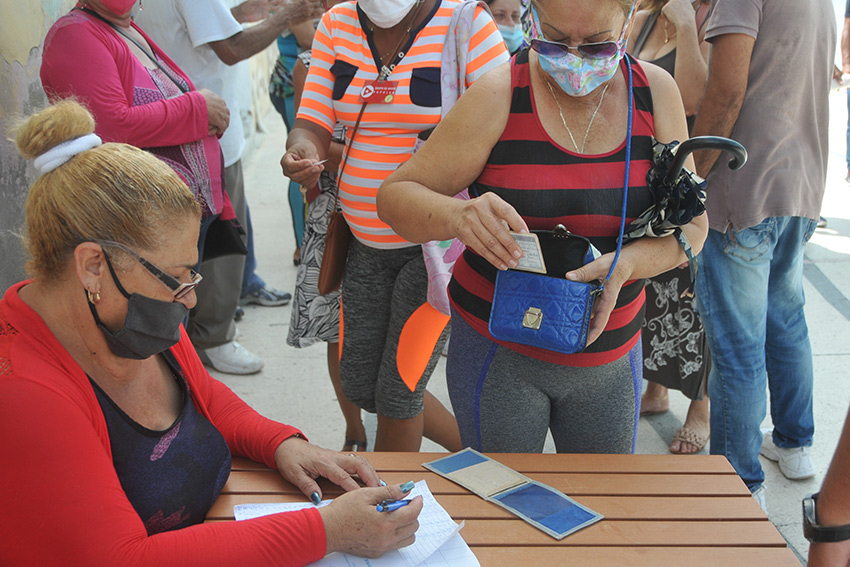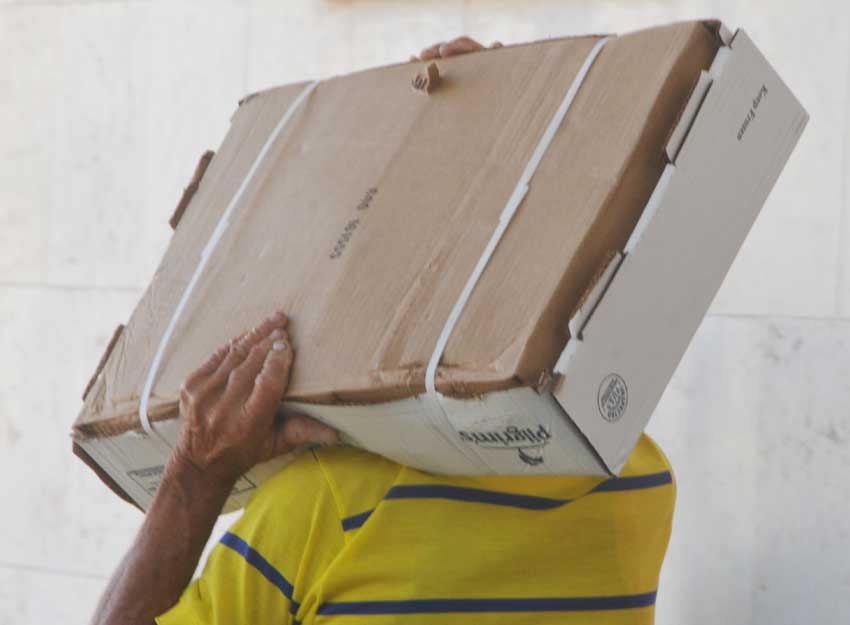
The first thing Luisa did when she woke up was to take a look at the refrigerator and the deserted and frozen image petrified her. Down there in a drawer, there was only one egg, difficult to share between her two children. Immediately a lump in her throat tightened and her appetite dissipated. Half an hour later she heard a rumor and her soul returned to her body: "The chicken box has arrived".
She twinned, as best she could, with two neighbors and went from the vicinity of the Airport blade to the National Terminal. He was doing the math on how far the meat would be enough for him. Three hours later it turned out that the box that was meant for three (two packages per person) ended up being for four. Luisa returned home with only one dripping nylon.
...
Luisa's fate is replicated in many households. The granting of food and hygiene modules through the allocation in the regulated products stores network is a measure that seeks a more equitable distribution of necessities in the context of shortages, aggravated in recent times due to inflation. Its implementation, however, is increasingly raising more and more negative opinions.
Comments are very diverse in the main municipality. Some consumers of La Garantía, located in the center of this city, consider that in La Reguladora and La Gloria, with the same geographical position as theirs, more modules are sold, and they do not know if it is due to the management of the administrators or the delegate.
Amalia, from the periphery of the locality, is more categorical. "I can assure you that they have never sold me a bottle of shampoo or cream, on one occasion I bought two bars of soap. My sister, from the Aurora neighborhood, gives me shampoo as a gift because she was often given combing cream, and she has been able to keep it".
In La Venezolana, also far from the city area, the panorama is similar, they do not understand how, being a neighborhood in vulnerable conditions, they receive so little. "The thing is that they almost invariably start from 1 onwards, and it has happened that the last numbers do not reach part of the offer, or receive less".
Clara, who belongs to La Voluntad, in the Fernando Betancourt neighborhood, says something similar: "Last month, the first numbers took detergent, and they have not even bothered to explain when the rest will get theirs. On one occasion there was five-liter oil for the first ones, for the last ones we touched a sachet."
"I am struck by what happens with cigarettes; they give them to a few and then say they are finished. Nobody controls, because they don't declare from the beginning the amount. Then you see it being resold in the street, the same happens with chicken and so on. There is a lot of business around the modules," emphasizes Redisbel, from Buena Vista.
Adisley Rodríguez Reyes, deputy superintendent of the Public Administration Council in charge of Consumption and Services, points out to 26 that several entities are working on this issue in search of more transparency and popular satisfaction.
"In the retail store, there are always those designated by Commerce, the warehouse workers, and the Support Group. A box of chicken, when there is no weight variation, is for three customers, not for four; if it happens, it is a violation. The distribution is intended to be equitable and the planning is based on the premise that the supply is enough for all the customers mentioned".
 Ernesto Ginarte Cruz, an official of the Vice Superintendence of Consumption and Services, contributes other considerations. "Initially it was a box for two, but due to the deficit, it was increased to three. We emphasize that it was conceived to be five kilograms for each nucleus. Now we count on the one that comes in boxes, which must be separated. When it is in packages, we sell the quantity that completes the established grammage," he emphasizes.
Ernesto Ginarte Cruz, an official of the Vice Superintendence of Consumption and Services, contributes other considerations. "Initially it was a box for two, but due to the deficit, it was increased to three. We emphasize that it was conceived to be five kilograms for each nucleus. Now we count on the one that comes in boxes, which must be separated. When it is in packages, we sell the quantity that completes the established grammage," he emphasizes.
"The public looks at it in boxes, and we look at it in kilograms; the day a box of 10 comes, it will only be available for two cores. This must be understood to avoid misinterpretations.
"I also clarify, concerning the distribution of the warehouses, that a mechanism has been created in a table that does not allow the sale to be repeated in each booklet so that when a rotation concludes, the process begins with the number from which it was left the last time.
"The public conceives as such shampoo, conditioner, cologne, soap; we include in this group the detergent, which is what we currently have on offer.
"The products sold under the free module modality, but controlled by the local government, come within a period - the so-called OFICODA (Registry Consumers Office) cuts-, that refers to the total number of nuclei per store. The assortments we receive today are oil, pampers (for children from zero to 1 year, 11 months, and 19 days), detergent, and chicken."
FEWER PRODUCTS, MORE SECRECY
 Ana Luisa approaches these reporters with noticeable displeasure. She is very angry at the manager of her bodega for not wanting to inform her about the amount of cigarettes offered. As bad luck would have it, she was left without buying, and now she asks: "Who am I complaining to? How do I know that someone didn't take them?
Ana Luisa approaches these reporters with noticeable displeasure. She is very angry at the manager of her bodega for not wanting to inform her about the amount of cigarettes offered. As bad luck would have it, she was left without buying, and now she asks: "Who am I complaining to? How do I know that someone didn't take them?
Raymel Espinosa Saborit, deputy director of Grupo Empresarial de Comercio, reiterates that concerning these processes, the competencies of his workers are only limited to the graphic and oral disclosure of the day of the sale, the schedule, and the vending unit. In addition, they are responsible for the control of the customers who make the purchase. "Except for these functions, that's all we have".
Intending to optimize the service, the manager emphasizes that it would be appropriate to receive the information in advance so that the user can organize himself: "We would like to have the data at 7:30 a.m., but this is not always the case", and advises to visit the entity's institutional page, where the calendars in question are published daily.
"It is true that at first there was talk of bringing the products closer to the communities, in the most complex time of the pandemic, but sometimes it cannot be achieved because it depends on the supply designated by the Cimex and Caribe chain stores and the conditions of each establishment."
Ginarte Cruz, from his experiences in the vice intendancy, comments that with cigarettes it happens that sometimes they arrive at the designated point and they start selling them because they are not a staple commodity.
"It is not our obligation to keep the items because some consumers did not know about them and did not go to purchase them. The approved mechanism is that only while your warehouse is buying you have the right to do so.
"The chain stores send us the products the day before so that we have time to notify people through the corresponding channels, because there are no conditions to store in refrigerators, much less now with the lack of fuel."
EQUITABLE ROTATIONS?

During the pandemic there was a rumor that the sale of the modules depended on the management of the delegates; in this sense, Ernesto Ginarte explains that this has never been their responsibility since the process depends on the turns or rotations that are carried out to benefit all.
Although he clarifies that when some assortment arrives a little late in the day, they look for the popular councils with warehouses that are relatively close to the supplied store, a matter that favors the most central areas.
"We must take into account that there are consumers who live in rural areas, who also have the right, therefore, in the rotations through the 19 popular councils with 148 warehouses and a total of 79 thousand 560 nuclei, they must be included.
"For example, in those places since December there was no distribution of disposable diapers and here there was a large batch, from January to March it was given twice to the entire city center. Now we have to prioritize those who are missing.
"One of the works that we carry out as Government of the municipality is to reach with the pampers to maternal homes and hospital wards that have mothers with children at this stage. We join with Health, which provides the statistics."
IN TIMES OF SCARCITY AND MORE...
Adisley Rodriguez brings to the table a well-known issue, the supplies that are currently arriving do not meet the demand in the province. Concerning shampoo and conditioner, which are in great demand by the population, they arrive in small portions and not every month.
In this context, maintaining the distribution of modules is a clear protection for consumers, but it is necessary to look inside its dynamics to avoid illegalities that may arise, especially when in the street the same items have unattainable prices for ordinary Cubans.
A clear and timely notification of the amount of merchandise on sale is required to make the procedure more transparent and avoid unpleasantness and unpleasantness for the parties involved. It will not be idle to include in the analysis the cuddly laws that are frequently passed that prevent a customer from buying from others.
This press team attempted a dialogue with Cimex, one of the chains most involved in the sales, but it was impossible. Their requirements and procedures for sharing information go against the immediacy of the news. We consider it an important source because according to several interviewees, it would also be beneficial to shorten the time with which the date of purchase and the authorized establishments are announced. However, we were not given access to the opinion of the entity; in contradiction with the fact that whoever offers a service to the people must render an account, and without so much delay.
What can we say about the chicken boxes that are for three and sometimes end up being for four? The actions of inspectors and other forces of order cannot be limited only to the organization of the queues. It must be a premise to protect the allowance of each person, especially today, when many, like Luisa, need the supplies of the state to put a plate of food on the table for their children.





